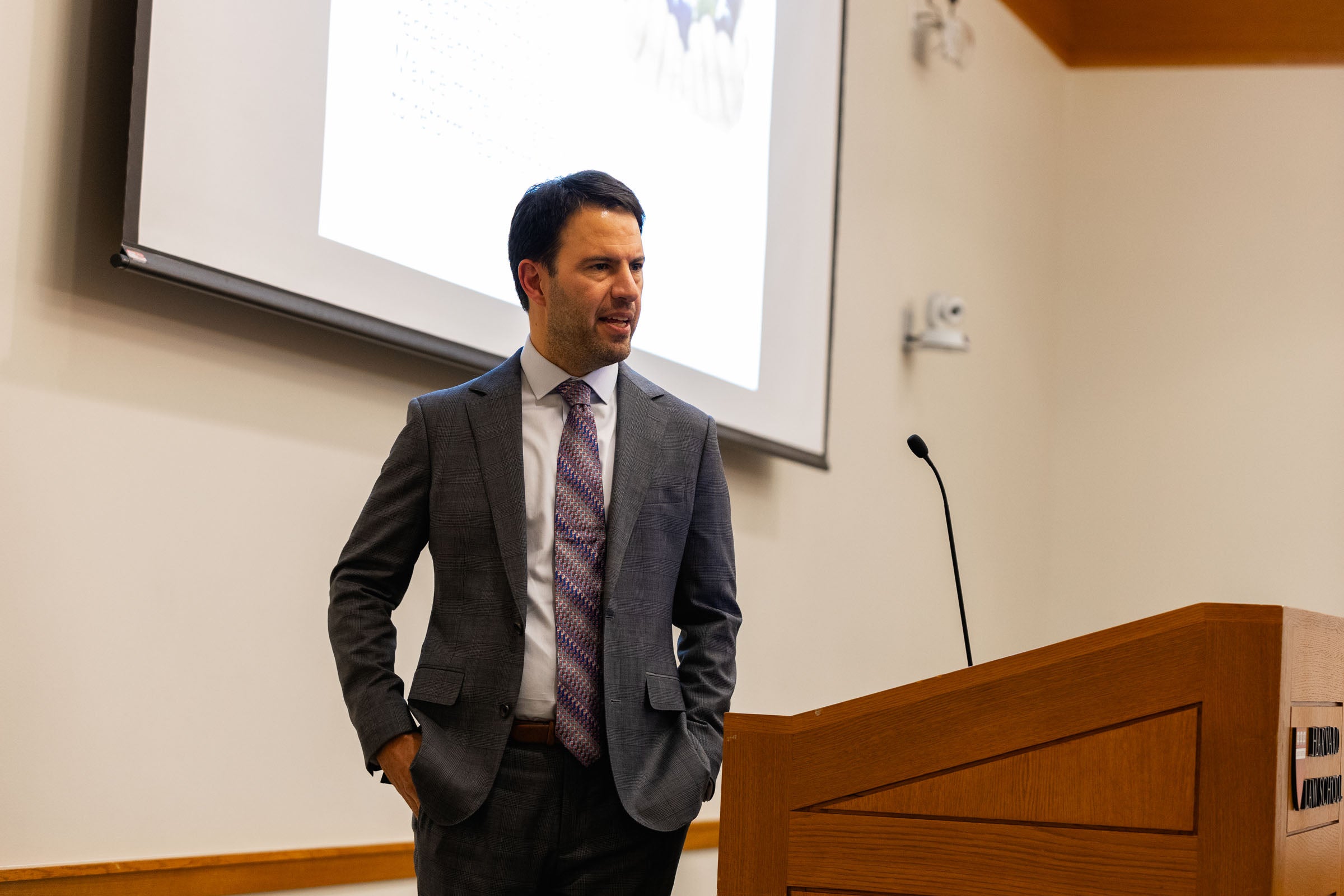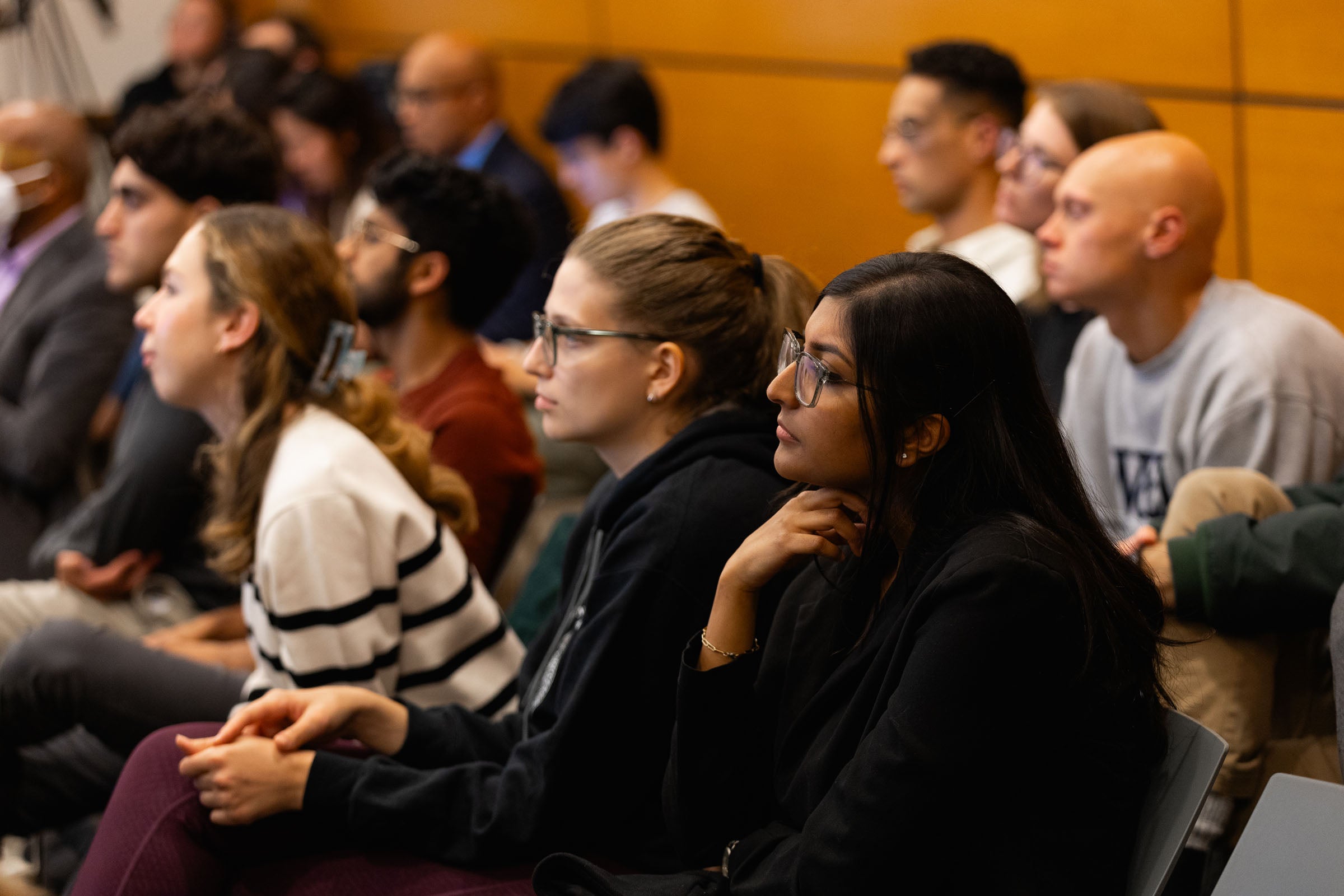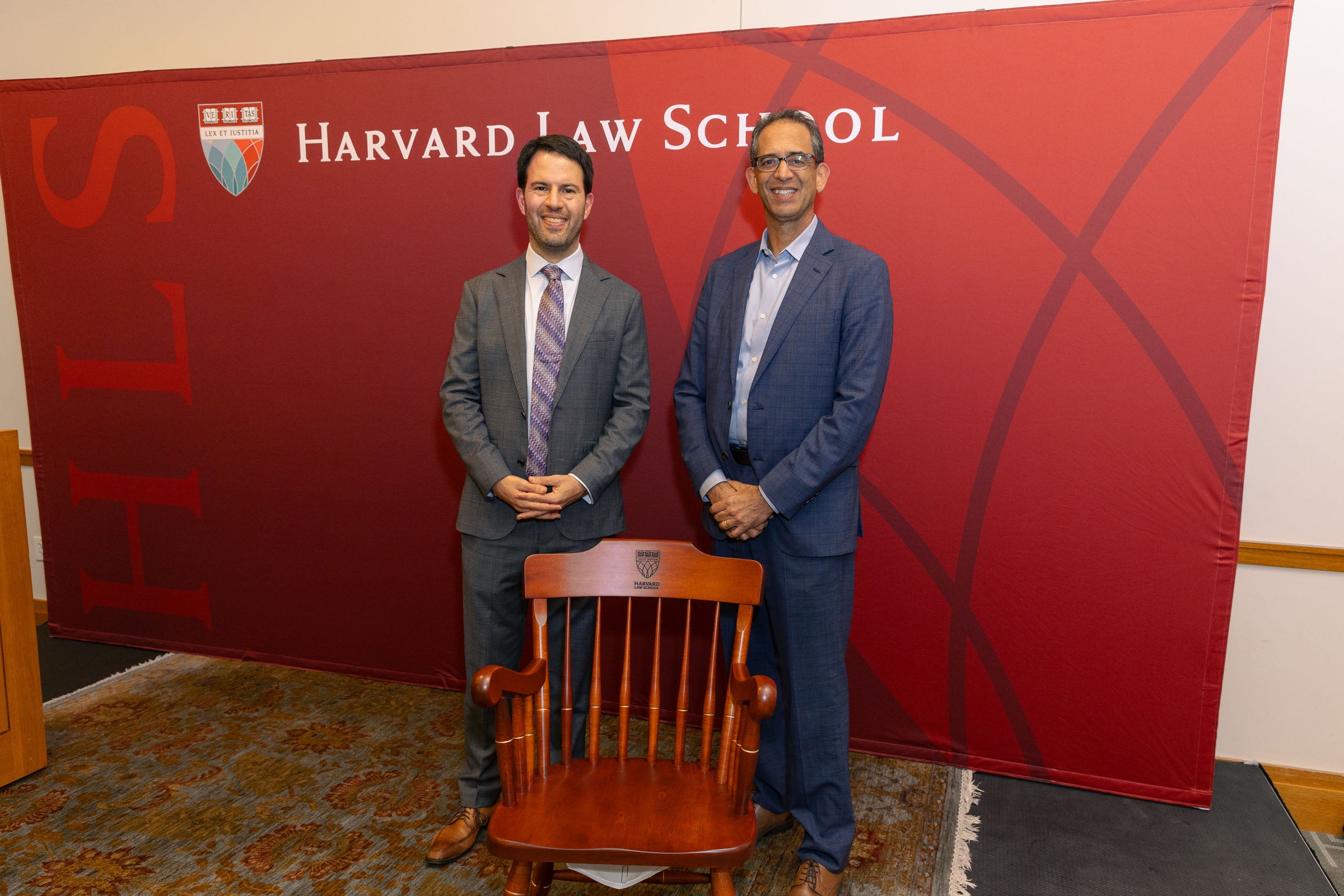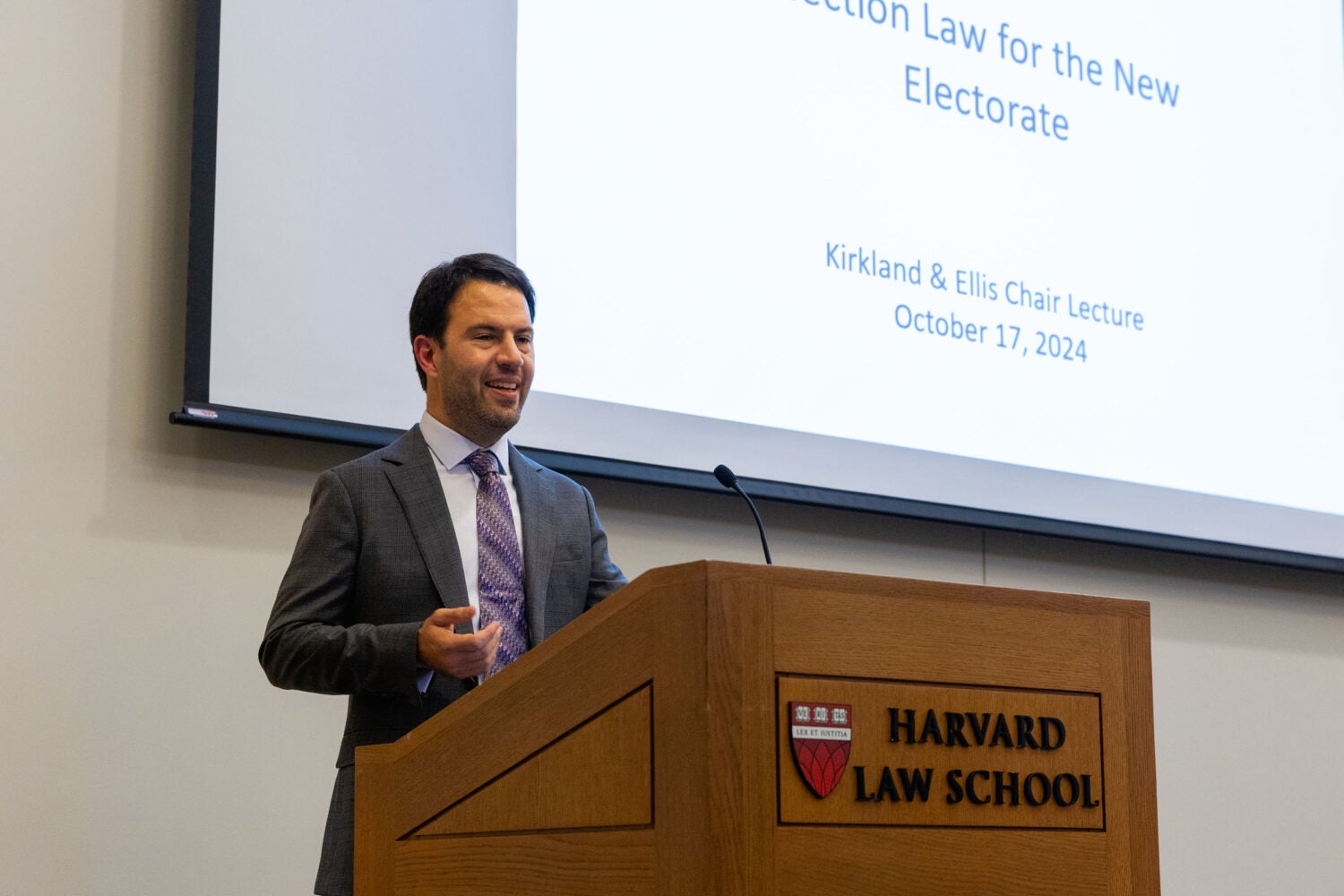Major shifts in voting by income, educational attainment, race, and geography are transforming America’s elections — but few have realized it yet, according to Harvard Law School Professor Nicholas Stephanopoulos.
“Together [these changes] amount to the most sweeping transformation of the electorate since the Civil Rights era. And they have profound implications for election law and election policy,” said Stephanopoulos, speaking at an event celebrating his appointment as the Kirkland & Ellis Professor of Law at Harvard.
In his remarks, which were based on a recent paper of his, Stephanopoulos explained how voters in the U.S. have changed in ways that could ultimately lead to fewer restrictions on voting, less partisan legislative districts, and ultimately, a “better world than the one it’s replacing.”
That is, he added, once political parties and other stakeholders recognize the transformation.
Interim Dean John C.P. Goldberg opened the event by praising Stephanopoulos’s extensive experience in teaching, scholarship, and involvement with critical voting rights litigation, calling the new chairholder “one of the nation’s foremost election law experts.”
On a personal note, Goldberg expressed his gratitude and admiration for Stephanopoulos’s commitment to Harvard Law. “He is completely devoted to the academic enterprise. He is fully engaged in the intellectual life of the law school. He is wonderfully supportive of his colleagues’ and students’ work, and in vital and often unseen ways, is a wise and effective administrator,” Goldberg said. “In short, and fittingly for a student of democracy, he is a model citizen.”
Changing voting patterns
After thanking his family, friends, and colleagues, Stephanopoulos began by identifying the first key shifts leading to what he called the “new electorate.”
“For decades, wealthier voters were substantially more Republican than poorer voters,” he said. “But over the last decade or so, this historical pattern has eroded and virtually disappeared.”
In other words, Stephanopoulos said, the electorate has undergone financial depolarization, with income no longer predictive of support for either political party. On the other hand, educational attainment has become increasingly polarized, he said, particularly among white voters. “Today, more educated voters are much more Democratic than less educated voters.”
These two factors — income and education level — are also highly correlated with political participation, Stephanopoulos said. As a result, “High propensity voters who tend to be richer and more educated are now a mixed, or even Democratic-leaning group, and low propensity voters, who tend to be poorer and less educated, are now a mixed or even Republican-leaning group.”


This conclusion challenges the conventional wisdom that Republicans are more reliable voters, he added. It also suggests that voting restrictions, such as photo ID laws — which impact low propensity voters the most, according to Stephanopoulos — are more likely to hurt, not help, the GOP. “Today, neither party has a strong electoral incentive to limit voting, and neither party has a good electoral reason to oppose making voting easier.”
Voting patterns by race are also changing, said Stephanopoulos. Since the Civil Rights era, Black and Latino voters have reliably tended toward the Democratic party, while a majority of white voters leaned Republican. But that arrangement is beginning to crack, he said. “Maybe surprisingly, in a couple of weeks, we’re likely to have the least racially polarized election in about a generation, since the 1990s.”
This, too, has legal implications, he said. In order to win a lawsuit based on a theory of racial vote dilution, the plaintiffs must show that the affected racial or ethnic group is politically cohesive. This is an increasingly difficult task “because minority voters are now more divided in their voting patterns,” said Stephanopoulos.
“Maybe surprisingly, in a couple of weeks, we’re likely to have the least racially polarized election in about a generation.”
He then highlighted a final trend that he said would influence elections moving forward: geographic polarization. While urban areas have long been reliable Democratic strongholds, they have become slightly less so in recent years, even while suburbs — which used to often lean marginally right — have shifted leftward. Rural districts, meanwhile, have “moved significantly in the Republican direction,” he said.
What this means is that both parties can gerrymander — or redraw legislative district lines to their benefit — with “comparable ease and effectiveness,” he said.
“When districts are drawn without considering electoral data, for example, by a computer algorithm, maps are no longer consistently biased in Republicans’ favor,” Stephanopoulos said. “Republicans had enjoyed an advantage for decades because their voters used to be distributed more efficiently, but that advantage is now much smaller and even nonexistent in many places.”
Future elections might be less ‘hostile and mean’
So how is this new electorate likely to affect elections and election law? Stephanopoulos was optimistic. If the parties — and the nation — acknowledge these shifts, we would have a “better world,” he said.
That’s because “no party today has much electoral incentive to restrict voting,” he explained. And less racially polarized voting is also a good thing, Stephanopoulos said, even if it might “undermine certain legal claims, [because] it’s unlikely to reduce overall minority representation, which is the goal that those claims are trying to achieve.”

Finally, Stephanopoulos said he believed it was “terrific news” that the country’s political geography has become more neutral. “This means that geography now puts less heavy a thumb on the scale of representation, and going forward, it could also mean that the parties will become more willing to reform redistricting and potentially end the practice of partisan gerrymandering.”
But Stephanopoulos cautioned that it might take a while to see the impact of the electorate’s metamorphosis.
“Everyone is still behaving as if voting restrictions benefit Republicans, and voting expansions benefit Democrats. [Or that] Republicans have an innate spatial advantage in redistricting,” he said. “This new reality absolutely has not sunk in yet for politicians and interest groups and lawyers and activists.”
But when it does, Stephanopoulos assured his five-year-old daughter, who was sitting in the audience, “It means that when you’re all grown up and get to participate in elections, they might not be as hostile and mean as they are now.”
Want to stay up to date with Harvard Law Today? Sign up for our weekly newsletter.
